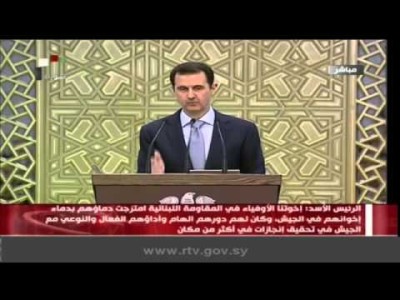In his first public speech since early May, Syria’s President Assad set out his plan for defeating “terrorism” but then admitted the military challenges faced by his regime in the face of an advancing rebellion.
Appearing on State TV, the President addressed a group of heads and members of public organizations, vocational syndicates; and chambers of industry, trade, agriculture, and tourism. He asked, “How could those who spread the seeds of terrorism combat it?”, and then answered his question:
Who wants to combat terrorism could do it through rational and realistic policies based on justice and the respect of peoples’ will of determining their future, managing their affairs, restoring their rights on the basis of spreading knowledge, combating ignorance, improving the economy, and raising awareness of the society as well as developing it.
Assad then blamed foreign powers for all of Syria’s problems:
It is obvious to all that colonization is the side that founded these factors and boosted them and is still boosting them….
The West still deals with terrorism in a hypocritical way.. They call it terrorism when it hits them. [They call it] revolution, freedom, democracy, and human rights when it hits us.
In May, Assad tried to rally public opinion after a series of losses by Syrian forces and advances by rebels, including the capture of almost all of Idlib Province in northwest Syria.
See Syria Feature: Assad Appears at “Martyrs” Ceremony, Acknowledging Defeats as Well as Claiming Victories
Syria Special: 3 Reasons Why Assad Will Lose The War
Speaking on Sunday about the military situation, the President repeated his admission before trying to frame a necessary sacrifice for eventual victory:
Sometimes, in some circumstances, we are forced to give up areas to move those forces to the areas that we want to hold onto. We must define the important regions that the armed forces hold onto so it doesn’t allow the collapse of the rest of the areas….
After years of war, the Syrian people have been resilient, sacrificing for the sake of the homeland, and if they had wanted to give up, they would not have waited all this time and paid as much as that.
Still, he gave the further admission of difficulties in manpower for the army, even as the regime has stepped up measures for forced conscription: “Everything is available, but there is a shortfall in human capacity.”
See Syria Daily, July 26: Confidence or Desperation? Assad Gives Amnesty to Deserters and Defectors
Declaring that “despite this, I am not presenting a dark picture”, Assad gave lengthy praise to Iran for the first time in a public speech:
It has provided support to Syria stemming from the fact that the battle is not a battle of a state, a government, or a President. Rather it is the battle of integrated axis, which does not represent states in so far as it represents an approach of independence, dignity, interests of nations, and stability of homelands.
The President also paid tribute to Hezbollah: “The blood of our faithful brothers from the Lebanese Resistance has mixed with the blood of their brothers in the Army.”
Assad concluded:
We are in a crucial stage where there are no compromises and hesitation is equal to defeatism, cowardice and treason…no relinquishment of any inch of land or rights….We will not be slaves, but we will be independent masters…masters of our countries, capabilities, and rights.

